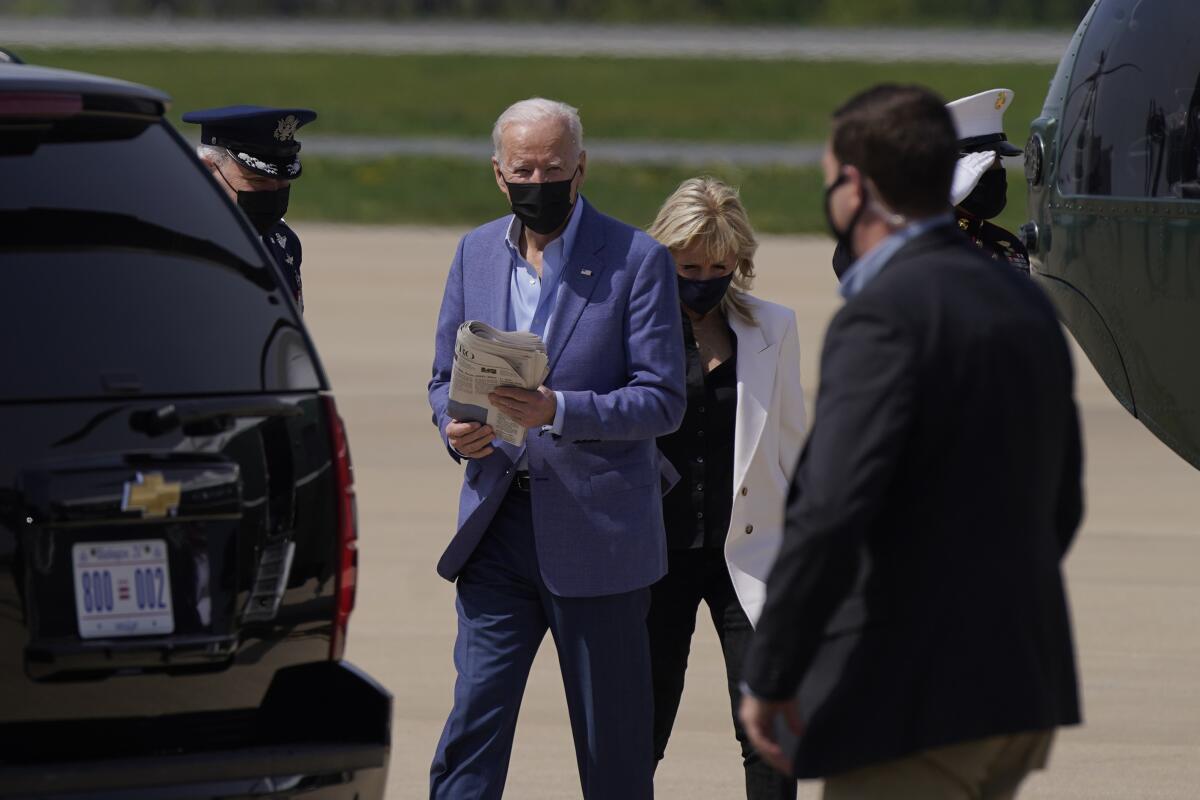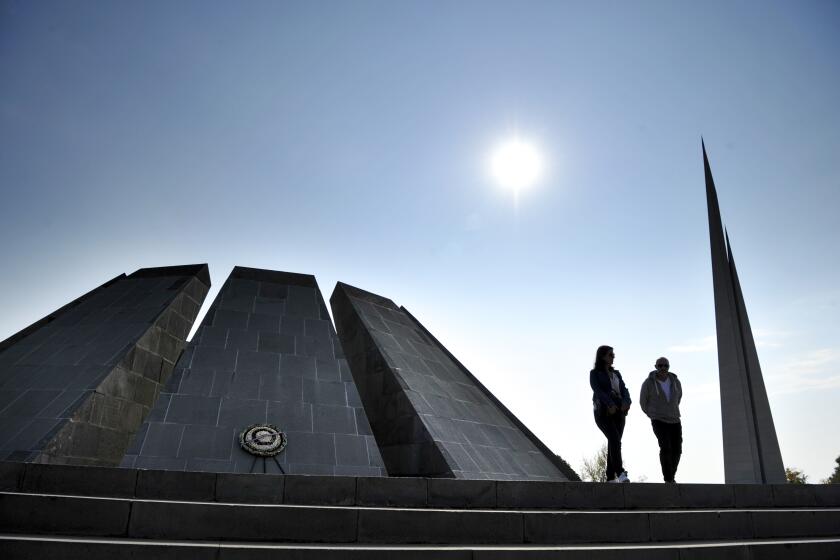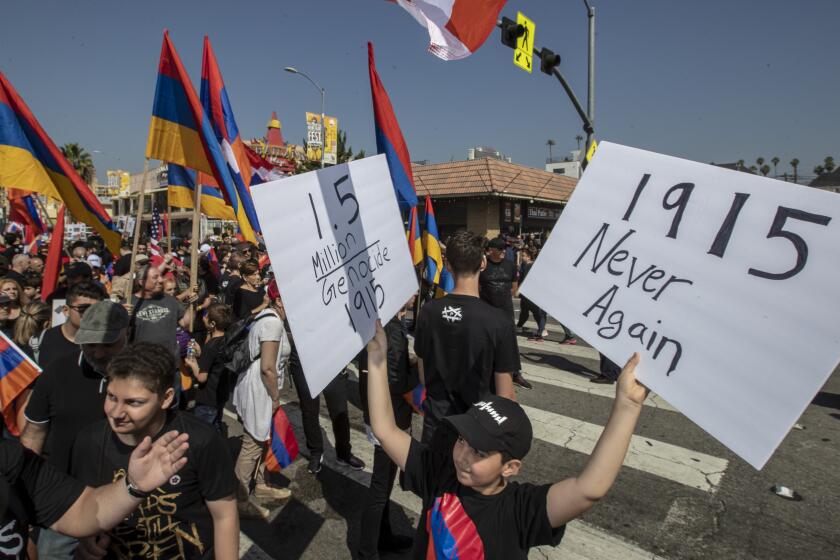Biden formally recognizes killing of more than 1 million Armenians as genocide

President Biden on Saturday formally recognized as a genocide the killing of more than 1 million Armenians starting in 1915.
- Share via
WASHINGTON — President Biden on Saturday formally recognized as a genocide the killing of more than 1 million Armenians starting in 1915, a label long used by historians but resisted by U.S. presidents to avoid angering Turkey, an important ally.
The decision is a victory for Armenian diaspora communities, notably in Southern California, that have spent decades fighting for such recognition only to be repeatedly disappointed by previous presidents. It will buoy Armenia as well, with the announcement coming months after the nation lost territory to its neighbor Azerbaijan in a bloody conflict over a disputed border region.
“Each year on this day, we remember the lives of all those who died in the Ottoman-era Armenian genocide and recommit ourselves to preventing such an atrocity from ever again occurring,” Biden said.
He added that Armenian Americans “have enriched the United States in countless ways, but they have never forgotten the tragic history that brought so many of their ancestors to our shores.”
A U.S. designation of Armenian genocide is bitterly opposed by Turkey but supported by many members of Congress.
The statement is a fulfillment of Biden’s campaign promise, and it’s the result of intense pressure from Armenian Americans and their allies in Washington. It’s also a reflection of the increasingly strained relationship between the U.S. and Turkey, which have been at odds over weapons purchases and the conflict in Syria.
Biden spoke to Turkish President Recep Tayyip Erdogan on Friday, and the White House said he expressed “his interest in a constructive bilateral relationship with expanded areas of cooperation and effective management of disagreements.” It’s another shift from former President Trump, whose affection for authoritarian leaders included Erdogan.
Turkish Foreign Minister Mevlut Cavusoglu reacted angrily Saturday, saying “we entirely reject” Biden’s statement.
“We have nothing to learn from anybody on our own past,” he said. “Political opportunism is the greatest betrayal to peace and justice.”
In his statement, Biden said his goal was “not to cast blame but to ensure that what happened is never repeated.”
Although Biden’s recognition was widely anticipated, Hasmik Burushyan, a leader in the Armenian Youth Federation in California, said she still felt relief when he made it official, “breaking the cycle of being complicit” in Turkey’s denials that a genocide ever took place.
“It was long overdue,” she said. “But I know our ancestors can have some sort of peace today.”

The Armenian genocide occurred during the twilight of the Ottoman Empire, which allied itself with Germany during World War I. After their ill-fated invasion of Russia, Turkish leaders became suspicious of the empire’s Armenian Christian minority and began a years-long persecution.
Armenian leaders in Constantinople — known today as Istanbul — were detained, deported and killed on April 24, 1915 — widely considered to be the beginning of the genocide — and the campaign spread from there. Hundreds of thousands were killed, and others were forced from their homes on long marches into the Syrian desert, where many more died. Some estimate that 1.5 million were killed, a figure that Biden included in his statement on Saturday.
The modern-day nation of Turkey, which emerged from the Ottoman Empire, has insisted that the deaths were the result of wartime fighting, hunger and disease. Armenia became part of the Soviet Union after World War I and didn’t achieve its independence until 1991.
“President Biden’s affirmation of the Armenian genocide marks a critically important moment in the arc of history in defense of human rights,” said Bryan Ardouny, executive director of the Armenian Assembly of America.
Alex Galitsky, the Los Angeles-based communications director for the western region of the Armenian National Committee of America, said he hopes Biden goes further by shifting U.S. foreign policy to defend Armenia against Azerbaijan, its regional enemy for decades.
“We must continue this struggle as long as Armenians face a threat to their very existence in the lands they’ve inhabited for thousand of years,” Galitsky said.
Rep. Adam B. Schiff (D-Burbank) praised Biden’s statement as a “historic milestone.”
“In so doing, he has cast aside decades of shameful silence and half-truths, and the broken promises of so many of his predecessors, and spoken truth to power,” he said.
Presidents Obama and George W. Bush had promised to recognize the genocide but balked, instead referring to the events as a “mass atrocity” or “mass killings.” President Reagan referred to the massacres as a genocide only in the context of a statement on the Holocaust.
Many in Southern California’s Armenian community, the largest outside Armenia, say the fight for recognition is an integral part of their identity.
“Like the genocide of the Armenians before it, and the genocide of the Cambodians which followed it — and like too many other such persecutions of too many other peoples — the lessons of the Holocaust must never be forgotten,” Reagan said in 1981.
Congress passed a resolution in 2019 to declare it was official U.S. policy to recognize the Armenian genocide even though Trump declined to make a similar statement. Erdogan lashed out, calling “such an accusation to be the biggest insult to our people.”
However, he did not recall the Turkish ambassador to Washington, a step he took with his envoys to the Vatican and Germany when Pope Francis and German lawmakers acknowledged the genocide in previous years.
Turkey has been a key ally for decades, and it’s been a member of the North Atlantic Treaty Organization since 1952. The U.S. based nuclear missiles there during the Cold War, and an estimated 50 nuclear bombs remain stored at the Incirlik Air Base. The facility played an important logistical role during the U.S.-led invasions of Afghanistan and Iraq after the Sept. 11 terrorist attacks, providing a way station for supplies and troops.
But more recently an increasingly autocratic Erdogan has faced criticism for tightening his grip after a coup attempt failed to depose him in 2016. He also purchased an estimated $2.5 billion in surface-to-air missiles from Russia, leading to U.S. sanctions.
The U.S. and Turkey also found themselves at odds over Syria’s years-long civil war. American troops allied themselves with Kurdish forces in the fight against Islamic State, but Erdogan considers them a hostile threat to his own country and he sent the Turkish military to attack them in 2019.
More to Read
Get the L.A. Times Politics newsletter
Deeply reported insights into legislation, politics and policy from Sacramento, Washington and beyond. In your inbox three times per week.
You may occasionally receive promotional content from the Los Angeles Times.














